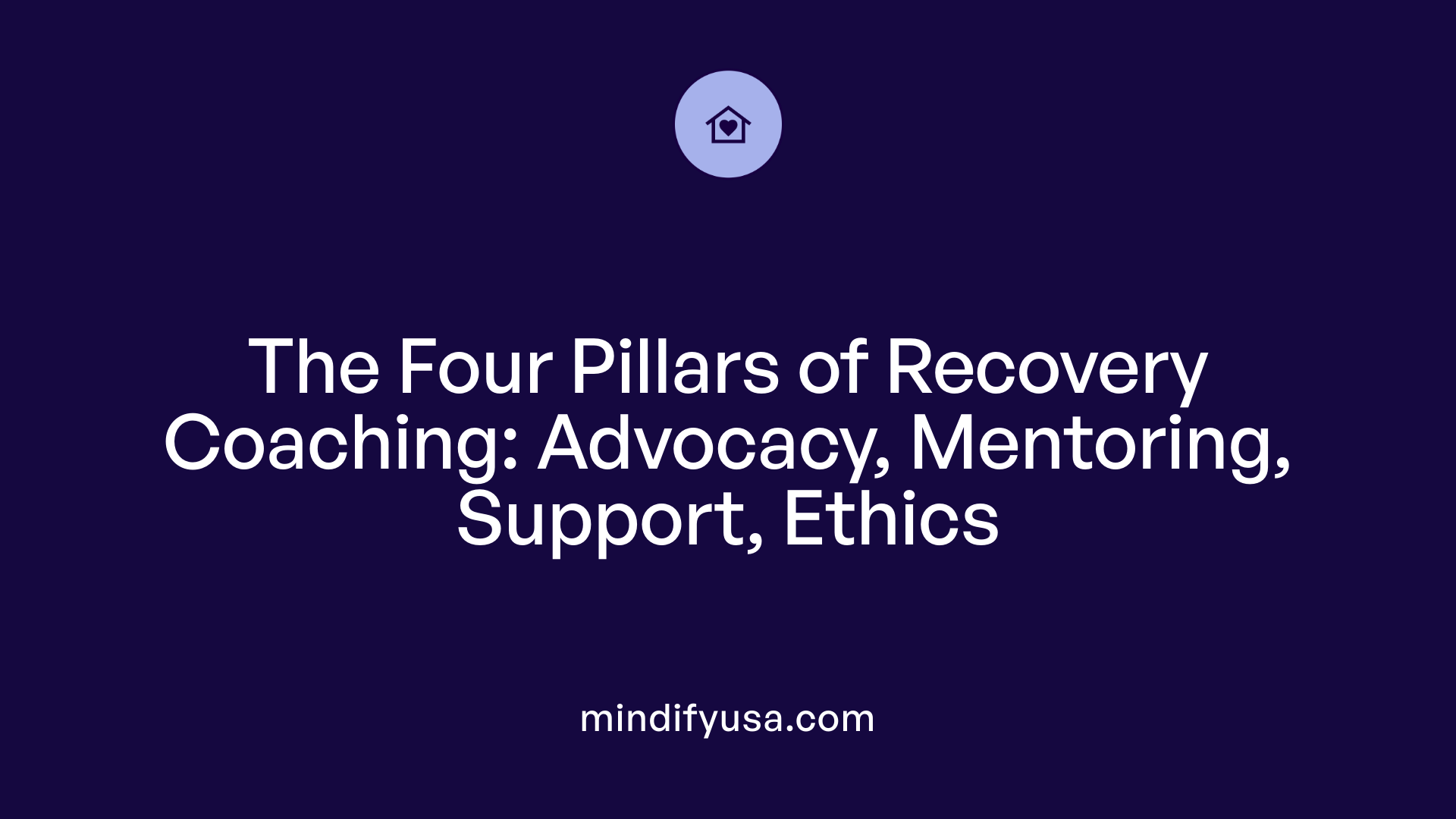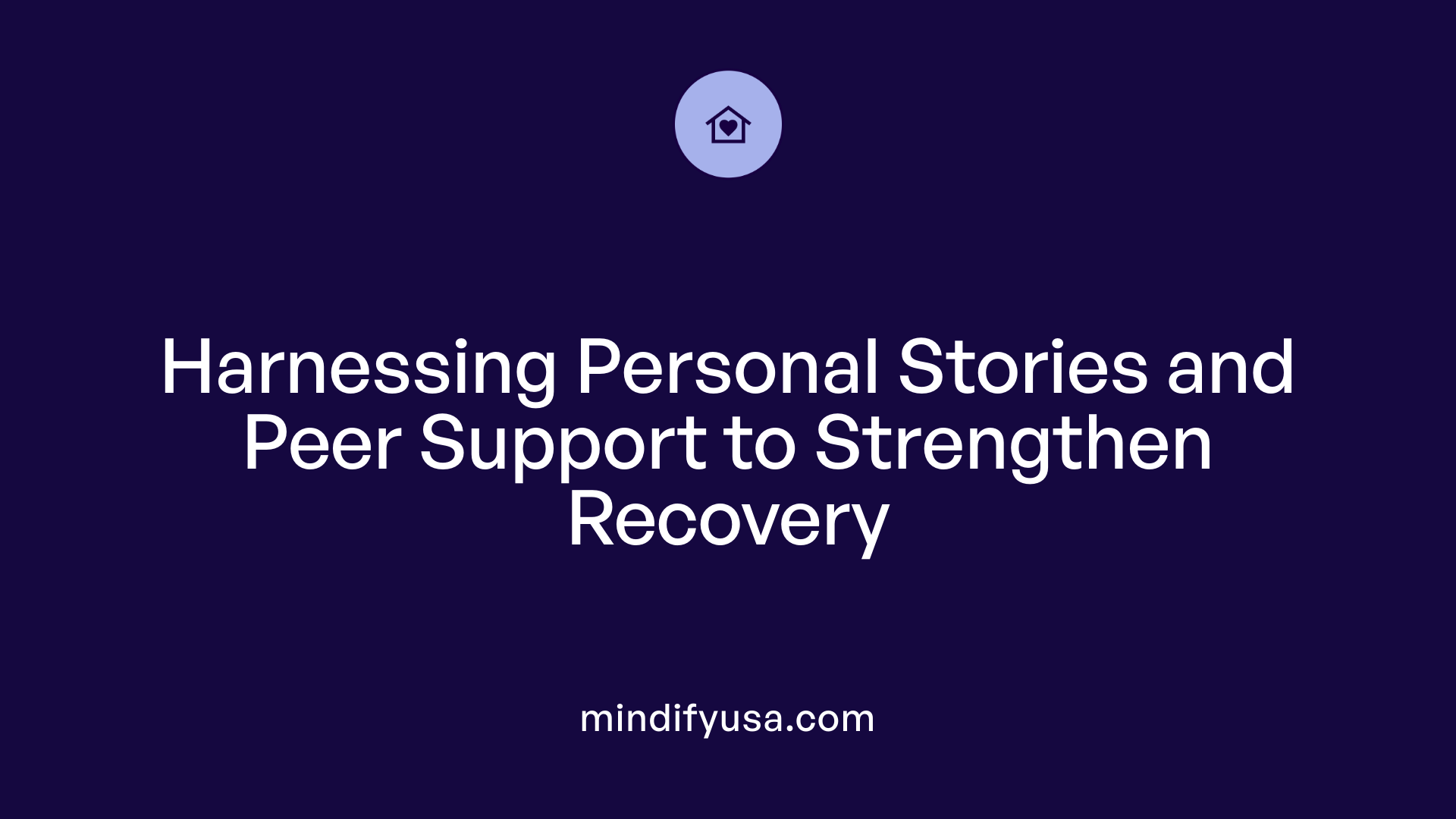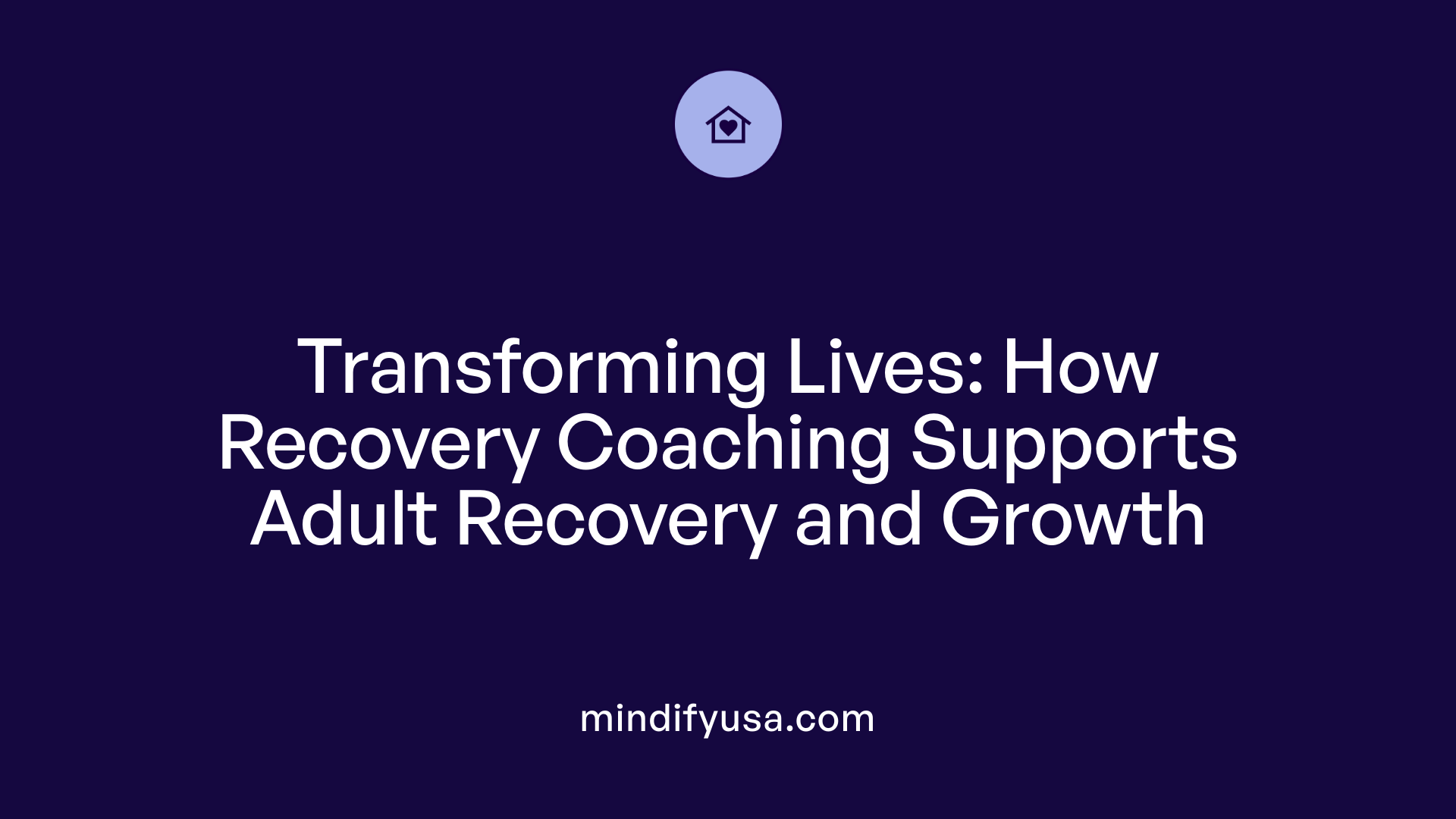Understanding the Critical Role of Recovery Support During Major Life Changes
Adult life transitions—such as recovering from addiction, returning to employment, or relocating—present unique challenges that can impact an individual’s stability and growth. Recovery coaching has emerged as a vital support system, empowering adults to navigate these complex shifts effectively. This article explores the multifaceted role of recovery coaching, highlighting its benefits, functions, and the way it helps foster resilience and personal development during pivotal life moments.
Defining Recovery Coaching and Its Distinctive Focus

What does recovery coaching involve?
Recovery coaching is a tailored support service aimed at assisting individuals who are striving to overcome substance use disorders or addictive behaviors. Recovery coaches are trained professionals, often with personal experience of recovery, who provide practical guidance, motivation, and accountability. They help clients set achievable goals, develop coping skills, navigate challenges, and connect to essential resources such as treatment programs, support groups, and community services.
During their sessions, recovery coaches focus on building trust, fostering hope, and encouraging continuous progress. They assist with everyday life skills like managing cravings, establishing routines, and rebuilding social networks. This support lasts throughout various recovery stages, especially during the vulnerable initial months after treatment or relapse.
The process involves initial assessment, goal-setting, action planning, ongoing support, monitoring, and adjustment of strategies to ensure sustained growth. Coaches often communicate through multiple channels, including phone calls, texts, video chats, and in-person meetings, to provide flexible support tailored to individual needs.
How is recovery coaching different from general life coaching?
While both recovery coaching and general life coaching aim to help individuals improve their lives, their core focuses are distinct.
| Aspect | Recovery Coaching | Life Coaching |
|---|---|---|
| Purpose | Support individuals managing addiction or mental health challenges | Help clients achieve personal, professional, or lifestyle goals |
| Approach | Emphasizes emotional support, relapse prevention, resource connection, and overcoming addiction-related obstacles | Focuses on self-discovery, goal setting, and overcoming general life hurdles |
| Training & Certification | Trained in addiction recovery, often with lived experience | Trained in personal development, with no specific addiction training |
| Scope | Holistic, goal-oriented support tailored to recovery | Broad, covers multiple facets of life without necessarily addressing addiction |
What is the difference between a life coach and a recovery coach?
Life coaches primarily assist clients in gaining clarity, overcoming general obstacles, and creating actionable strategies for success in various life aspects. They support personal growth, career development, and overall well-being.
Recovery coaches, however, focus specifically on supporting individuals through the recovery process from substance use disorders. They provide targeted assistance such as managing cravings, avoiding triggers, navigating treatment systems, and rebuilding social and daily life routines.
Both roles are supportive but differ significantly in training, scope, and intent. Recovery coaches often share their personal experiences to foster trust and understanding, creating an equitable relationship aimed at sustaining sobriety and personal growth.
For more information about the differences between life coaching and recovery coaching, a search using the phrase "Differences between life coaching and recovery coaching" can provide additional insights.
Core Roles and Responsibilities of Recovery Coaches

What are the four roles of a recovery coach?
Recovery coaches serve in four main capacities: advocacy, mentoring and education, supporting recovery and wellness, and maintaining ethical boundaries. These professionals typically possess lived experience with addiction or recovery, which helps them relate authentically and build trust.
First, advocacy involves supporting individuals in accessing necessary services and navigating complex systems such as healthcare, housing, and employment. Coaches act as champions for their clients, ensuring they receive respectful and person-centered care.
Second, mentoring and education are integral. Recovery coaches share their own stories and insights, providing both practical guidance and emotional support. They teach life skills, coping strategies, and help set achievable goals tailored to each person's recovery journey.
Supporting recovery and wellness encompasses helping clients develop habits and routines that promote sobriety, injury prevention, and overall mental health. Coaches assist with managing cravings, avoiding triggers, and fostering motivation for lasting change.
Finally, maintaining ethical boundaries is crucial. Coaches adhere to ethical standards that ensure respectful, non-judgmental engagement, safeguarding confidentiality and emphasizing patient autonomy. This professionalism fosters a safe environment where clients feel valued and empowered.
Overall, recovery coaches act as personal guides, mentors, and advocates. They utilize their experience and training to support individuals in achieving their recovery goals, enhancing their quality of life and reintegration into the community.
Boundaries and Ethical Considerations in Recovery Coaching

Why are boundaries important in recovery coaching?
Establishing and maintaining boundaries is essential for creating a safe, respectful, and effective support environment. Boundaries help define the roles and limits of both the recovery coach and the client, preventing misunderstandings and maintaining professionalism.
Clear boundaries foster trust and respect. They ensure that the support remains focused on recovery goals without crossing into personal or inappropriate territory. Boundaries also protect clients’ privacy, autonomy, and dignity.
What are the boundaries of a recovery coach?
The boundaries of a recovery coach encompass the clear definition of safe, appropriate, and professional interactions with clients, ensuring the protection and respect of both parties. These boundaries are guided by ethical principles that uphold confidentiality, autonomy, dignity, and recovery support, while also preventing conflicts of interest or exploitation.
The recovery coach is responsible for establishing, maintaining, and managing these boundaries to foster trust and effectiveness in the support relationship. Given the inherently vulnerable nature of peer support, careful boundary management is essential to avoid blurring lines that could impair judgment or compromise the integrity of the relationship.
Ultimately, maintaining appropriate boundaries helps uphold the core values of honesty, respect, and professionalism, safeguarding both the client's wellbeing and the integrity of the recovery process.
Guidelines for ethical practice in recovery coaching
Ethical principles are vital in guiding recovery coaches to serve their clients responsibly. These include:
- Maintaining confidentiality unless breaking it is legally or ethically necessary, such as in cases of harm.
- Respecting client autonomy and decision-making.
- Avoiding dual relationships or conflicts of interest that could impair objectivity.
- Being honest and transparent about the scope of support provided.
- Engaging in ongoing education and supervision to ensure ethical standards are upheld.
Adhering to these principles helps prevent exploitation and fosters a trusting, empowering environment for clients.
How is client confidentiality protected?
Protecting client confidentiality is fundamental in recovery coaching. Coaches are expected to keep personal and recovery information private, sharing details only with authorized individuals involved in the client’s care or as mandated by law.
Secure record-keeping, private meeting spaces, and careful communication practices, including secure methods of contacting clients, support confidentiality. These measures ensure clients feel safe and confident in sharing sensitive information, which is crucial for effective recovery support.
In summary, boundaries and ethics are the backbone of recovery coaching. They promote respectful, honest, and safe relationships that facilitate meaningful progress in recovery while safeguarding the dignity and rights of individuals seeking support.
The Process and Scope of Recovery Coaching

Initial assessment and goal setting
Recovery coaching begins with an initial assessment where the coach and individual discuss their current situation, challenges, and aspirations. The coach helps identify strengths and areas needing support, setting personalized recovery goals. This phase establishes trust and lays the groundwork for tailored plans.
Action planning and ongoing support
Once goals are defined, the coach and individual develop a practical action plan. The plan includes steps such as establishing routines, avoiding triggers, and building support networks. Recovery coaches provide ongoing motivation, monitor progress, and adjust strategies as needed. Regular contact—via phone, video, or in person—ensures continuous encouragement and accountability.
Integration with other recovery resources and healthcare
Recovery coaching complements clinical treatment by connecting individuals to resources like therapy, medication-assisted treatment, and community groups. Coaches assist with navigating healthcare systems and attending support meetings. They also educate clients about overdose prevention and life skills, enhancing the overall recovery process.
| Phase | Key Activities | Support Methods | Examples |
|---|---|---|---|
| Initial assessment & goal setting | Establishing rapport, identifying needs | Personal conversations, goal worksheets | Setting sobriety milestones |
| Action planning & ongoing support | Building routines, addressing obstacles | Regular check-ins, progress reviews | Managing cravings, social reintegration |
| Resource integration | Connecting to external supports | Referrals, medical and community resources | Housing, employment, family support |
Leveraging Shared Experiences and Peer Support in Recovery

How personal recovery stories foster trust and motivation
Recovery Coaches often share their own journeys of overcoming addiction to build trust with those they support. These personal stories demonstrate that lasting change is possible and give hope to individuals still struggling. When recovery coaches open up about their experiences, they help create an environment of honesty and understanding, making clients more comfortable sharing their challenges.
Their stories serve as powerful tools that inspire confidence and a sense of connection. By seeing someone who has faced similar obstacles succeed, clients feel motivated to pursue their own goals and believe in the possibility of a full recovery.
The role of peer support and lived experience
Peer support is a vital element of recovery coaching, emphasizing the importance of shared experiences. Recovery Coaches with lived experience bring empathy and credibility that enhance the support process. They understand firsthand the emotional rollercoaster of addiction and recovery, which allows them to relate authentically with clients.
This connection helps establish an equitable relationship, where clients feel heard and supported without judgment. Peer support programs have been shown to improve treatment adherence, increase self-efficacy, and foster community engagement.
Recovery Coaches leverage their personal backgrounds to guide clients through obstacles like cravings, emotional distress, and life transitions. Their involvement often leads to increased motivation, confidence, and ultimately, sustained recovery.
How peer support benefits recovery outcomes
Studies indicate that peer-led interventions can reduce substance use, improve quality of life, and help manage stress. With their lived experience, recovery coaches can identify effective coping strategies and share practical tips. They act as mentors, inspiring hope and resilience while connecting clients to broader support networks.
In summary, personal stories and shared experiences enrich recovery coaching by building trust, providing motivation, and fostering a supportive community essential for enduring sobriety.
Benefits of Recovery Coaching in Supporting Adult Transitions

Promoting sustained sobriety and personal growth
Recovery coaching provides continuous motivation and guidance, helping individuals maintain sobriety over the long term. Coaches support clients in developing essential life skills, setting achievable goals, and building confidence. Through personalized plans, they help their clients navigate daily challenges, from managing cravings to establishing routines, which are vital for lasting recovery.
Improving quality of life, employment, and social connections
Recovery coaches actively assist clients in reintegrating into society by connecting them with housing, employment opportunities, and community activities. They help rebuild social networks, foster new healthy relationships, and encourage participation in supportive groups. These efforts contribute greatly to enhancing overall well-being and stability.
Reducing relapse risk
Research from 2022 highlights that recovery coaching significantly decreases the chances of relapse. Coaches help clients recognize and avoid triggers, teach coping strategies, and maintain accountability. Their ongoing support plays a crucial role during vulnerable periods, such as returning to work or managing personal stress, thereby strengthening the resilience needed for sustained recovery.
What are the benefits of recovery coaching?
Recovery coaching helps individuals adhere to treatment protocols, reduce substance use, and increase their confidence and self-efficacy. By fostering hope and offering practical support, recovery coaches facilitate positive lifestyle changes. They connect clients with vital resources like healthcare, housing, and social services, supporting transitions into a healthier, more stable life.
The supportive relationship built on shared experiences, trust, and ongoing encouragement makes recovery coaching an essential component in adult recovery journeys. It empowers individuals to achieve personal milestones, maintain sobriety, and live fulfilling lives.
Empowering Adults to Embrace Life Transitions
Recovery coaching serves as a cornerstone for adults navigating significant life transitions, providing personalized, compassionate support tailored to each individual’s journey. By fostering trust, maintaining professional boundaries, and leveraging shared experiences, recovery coaches help clients build resilience, achieve personal goals, and foster long-term wellness. As a non-clinical yet impactful approach, recovery coaching complements other treatment avenues, making it an essential part of holistic adult recovery and growth.
References
- Recovery Coach - Mental Health Association
- The Role of a Recovery Coach in Overcoming Addiction - FAR
- The Role of a Recovery Coach - Healthy Acadia
- What is Recovery Coaching for Substance Addiction?
- Roles and Effects of Peer Recovery Coach Intervention in the Field ...
- What is a Recovery Coach in Los Angeles, CA
- Recovery Coaching - Advocates
- What Can a Recovery Coach Do for You? - Blue Wing Care
- What is a Recovery Coach?
- [PDF] Recovery Coach Guidebook - Mass.gov






































































































